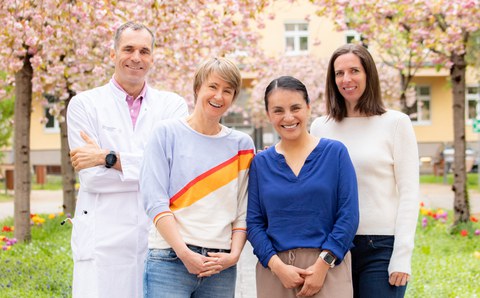28.04.2025
Eisenstoffwechsel und Knochengesundheit: 4,7 Millionen Euro für die DFG-Forschungsgruppe „FerrOs“ unter Dresdner Leitung

Die Dresdner Projektgruppe von „FerrOs“ (v.l.n.r.): Prof. Lorenz Hofbauer, PD Ulrike Baschant, Dr. Maria Ledesma-Colunga und Projektleiterin Prof. Martina Rauner.
Das Spurenelement Eisen ist essenziell für das Leben. Sowohl zu wenig als auch zu viel erhöhen die Knochenbrüchigkeit und damit die Gefahr für Osteoporose. Die zugrundeliegenden Mechanismen dieses Phänomens sind bislang jedoch nur unzureichend bekannt. Hier setzt die Forschungsgruppe 5146 „FerrOs“ unter Leitung von Prof. Martina Rauner, Professorin für Molekulare Knochenbiologie an der Medizinischen Klinik 3 am Uniklinikum und des UniversitätsCentrums für Gesundes Altern der Medizinischen Fakultät der TUD, an. Für die Fortsetzung ihrer zukunftsweisenden Forschung zum Eisen- und Knochenstoffwechsel erhält das von ihr geführte Konsortium von der Deutschen Forschungsgemeinschaft (DFG) für die kommenden vier Jahre eine Förderung in Höhe von 4,7 Millionen Euro.
Seit 2021 koordiniert Prof. Martina Rauner die Forschungsgruppe „FerrOs“. Die Verlängerung der Förderung um weitere vier Jahre durch die DFG ermöglicht nun den Wissenschaftlerinnen und Wissenschaftlern der Medizinischen Fakultät der TU Dresden und des Universitätsklinikums Carl Gustav Carus gemeinsam mit Arbeitsgruppen aus Heidelberg und Köln, den Mechanismen zur Feinabstimmung der Eisenregulation und den molekularen Zusammenhängen zwischen Leber und Knochen weiter auf den Grund zu gehen. Die Leber als zentrales Organ für die Eisenhomöostase, also die Aufnahme, Verteilung und das Ausscheiden von Eisen, hält den systemischen Eisenspiegel in dem engen Bereich, der für die menschliche Gesundheit optimal ist. Treten ernährungsbedingt oder aufgrund von chronischem Blutverlust Eisenmangel bzw. aufgrund von hämatologischen oder genetischen Störungen Eisenüberladung auf, wirkt sich das negativ auf die Knochen aus.
„In den einzelnen Projekten untersuchen wir, wie die Aufnahme, der Transport und die Verteilung von Eisen im Organismus kontrolliert werden, welche zellulären Notprogramme gegen zu wenig oder zu viel Eisen schützen und welche Auswirkungen bestimmte Störungen dieser Regulation auf Krankheits- und Alterungsprozesse haben“, erläutert Martina Rauner: „Unser Ziel ist es, neue Einblicke in die Mechanismen eisenbedingter Erkrankungen zu gewinnen und neuartige duale Therapien zu entwickeln, die gleichzeitig auf die Vorbeugung und die Behandlung von Knochen- und Lebererkrankungen abzielen.“
„Im Namen der Medizinischen Fakultät freue ich mich sehr über diese Weiterförderung des FerrOs-Forschungsgruppe durch die DFG“, erklärt Prof. Esther Troost, Dekanin der Medizinischen Fakultät der TU Dresden. „Neben den vielen eindrucksvollen Forschungsergebnissen hat das Gremium der Gutachtenden besonders die Förderung des Nachwuchses, der Clinician-Scientists und der Frauen in der Forschung gewürdigt, auf das wir besonders stolz sind. Die Konzepte gelten nun als ‚Role Model‘ für zukünftige Anträge.“
Prof. Uwe Platzbecker, Medizinischer Vorstand des Universitätsklinikums: „Diese Förderung ist eine Bestätigung für die langjährig exzellente Knochenforschung, welche interdisziplinär die großen medizinischen Zusammenhänge untersucht. Damit leistet „FerrOs“ an der Dresdner Hochschulmedizin einen wichtigen Beitrag zu den Zukunftsthemen ‚Healthy Longevity und gesundes Altern‘.“
Die Forschungsgruppe 5146 „FerrOs“
Die Forschungsgruppe „FerrOs“ ist ein Zusammenschluss nationaler und internationaler Wissenschaftlerinnen und Wissenschaftler der TU Dresden, der Universität Heidelberg, des Deutschen Krebsforschungszentrums sowie der Universität zu Köln.
Für den Standort Dresden leiten Prof. Martina Rauner (Wissenschaftliche Leiterin des Bone Labs), Privatdozentin Ulrike Baschant (Arbeitsgruppenleiterin im Bone Lab), Dr. Maria Ledesma-Colunga (Junior Group Leader im Bone Lab) und Professor Lorenz Hofbauer (Direktor des UniversitätsCentrums für Gesundes Altern und medizinischer Leiter des Bone Labs) die Projekte mit einem Gesamtvolumen von 2,9 Millionen Euro.
Kontakt:
Prof. Martina Rauner
Bone Lab Dresden
Medizinische Klinik 3 & Zentrum für Gesundes Altern
Medizinische Fakultät Carl Gustav Carus der TU Dresden
01307 Dresden
+49 (0) 351 458 4206
Anne-Stephanie Vetter
Stabsstelle Öffentlichkeitsarbeit Medizinische Fakultät Carl Gustav Carus
der Technischen Universität Dresden
+49 (0) 351 458 17903
www.tu-dresden.de/med
